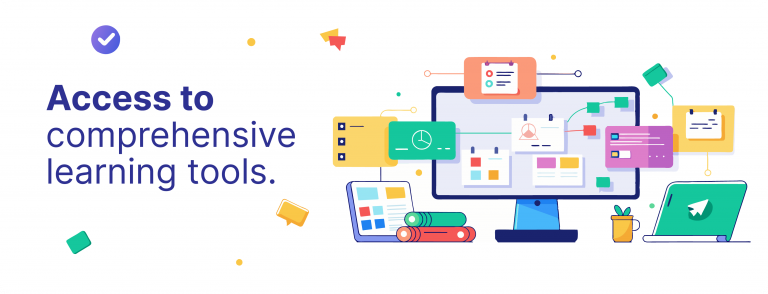E-learning is transforming the way people learn and making education accessible to more people than ever before. In fact, 76% of students say they prefer e-learning to in-person learning due to the flexibility and accessibility it provides, Business2Community reveals. E-learning also improves academic performance as it generates a knowledge retention rate in students of somewhere between 25%-60%, compared to just a 8%-10% rate for in-person teaching. By removing common geographical, financial, and disability barriers to education, online education makes the process of completing academic degrees or professional development easier, cheaper, and more enjoyable.
Plus, with Classe365’s comprehensive school management system, you can fully take charge of your education journey. The platform provides access to a host of e-learning tools and resources designed to keep educators and students on the path to academic success. Educators can create and manage courses and track attendance, while students can log on to complete tasks and study at their own pace.

Removing geographical barriers
Classe365 breaks down geographical barriers and makes education accessible to students no matter where they’re based. For example, in Australia, young people from regional, rural, and remote communities are under 50% as likely to achieve a university degree by the time they’re 35 years old compared to their urban-based counterparts. Remote students are also less likely than city students to pursue further education. And the farther away students are geographically from their nearest universities, the less likely they are to apply, a report from the Royal Melbourne Institute of Technology reveals. As the Classe365 platform is available 24/7 from any location, remote students now have the opportunity to easily access quality, affordable education that may have been previously out of reach. All that’s needed is a computer and an internet connection.
As Classe365 is accessible anywhere, it also eliminates the rigid timetable that’s necessary with traditional in-person classes. Learners can make time for online learning sessions whenever it suits their own schedule. It then becomes easier to balance study with work and family commitments as a result.
Personalize the learning experience
Online education can also be personalized to suit the needs, learning style, and ability of each individual student. Classe365’s e-learning pathways can be easily customized, which means students can pick and choose what and how they learn. They can work through course content at their own pace and focus on a chosen topic until they feel they understand it well and are ready to move on. This ultimately empowers students to take charge of their own learning, and makes for a far more engaging and effective educational experience. In comparison, traditional-style learning usually involves a rigid, one-size-fits-all approach where students passively receive information from the teacher — regardless of their interests or individual learning needs.
A growing body of research continues to show just how effective the sort of personalized structure that e-learning facilitates can be, particularly when compared to traditional learning approaches. For example, graduate students who participated in a personalized e-learning course reported enjoying the course overall, and said the personalized learning element gave them a greater “sense of autonomy, competence, intrinsic motivation, and learning”, a new research paper published in the Teacher and Teaching Education journal revelas. In contrast, students who participated in a traditional course said they were mostly unhappy with the learning style, and said they felt the course failed to meet their interests and learning needs.
Making education affordable
Online education is also more affordable and therefore accessible to a greater number of people. For example, in the U.S., a standard four-year degree at a private institution costs just over $185,252 on average, whereas a four-year online degree also from a private institution costs around $60,500, the Education Data Initiative reveals. E-learning is also cheaper at public universities, too, with an online degree priced at around $54,183, vs. over $85,000 for the same degree, in person. Digital education eliminates or drastically lowers the overhead costs typically associated with brick-and-mortar universities (including campus and administrative fees), which is largely what makes it a cheaper option.
Plus, online education also eliminates the need to commute entirely. Students can now learn from the comfort and convenience of their own homes — no need to spend money on gas or public transport. In the U.S., students who commute to college classes spend up to $1,360 a year on transport, versus $0 for online students. Campus meal plans also raise costs for traditional, in-person students. Students who attend in-person classes end up spending $600 dollars more on campus meals than at-home students for the academic year.
Improving student concentration and focus
Taking away financial pressure also allows students to better focus on their studies, which is essential for academic success. In fact, honing the ability to concentrate while studying at home or in the classroom is increasingly important as digital distractions like smartphones and social media are becoming harder to avoid. Students who accessed Facebook while studying were found to have lower GPAs, while “students who used a relatively high use of study strategies were more likely to stay on-task”, a study in the Contemporary Educational Technology journal reveals.
So, students need to practice self-discipline and develop (and stick to) a study routine that helps them avoid distractions and stay on track with their online education. This should involve prioritizing tasks for each study session, and breaking down big goals into smaller, more manageable ones. Fortunately, “becoming more disciplined is like building muscle—the more you work on it, the stronger it gets”, explains Dr. Chris Mosunic. And don’t forget to reward yourself after each session. Rewards are incentives that motivate you to keep working toward your goals over a longer period of time. “The more that you repeat this process, the easier it will be”, Meterlearners founder, Dimitris Gkiokas, also notes. So, by using self-discipline to make studying a habit, students will find it easier to get the most out of their sessions and ultimately succeed with e-learning.

Accessible to all learners
Around one billion people around the world are diagnosed with at least one disability, which includes learning disabilities, the United Nations reveals. And this figure’s only set to rise as the population increases. That means, now more than ever, education needs to be inclusive of all skills and abilities. Fortunately, online education can easily be made accessible to everyone, including students with special education needs. In particular, the rise of assistive technology — devices, software, or specialist equipment designed to help people with disabilities perform tasks they wouldn’t otherwise be able to — is playing a key role in making e-learning inclusive.
For example, screen readers are a useful software application that people with blindness, partial sight, and reading disorders use to read content on screens. This software uses text-to-speech technology to “read” aloud all sorts of written content from text, dialogue boxes, and headings to icons and buttons. Plus, speech-to-text software can also help people with writing difficulties to document their thoughts without the need for typing. Another great thing about screen readers is that they can also be affordable. Some options are even available to download for free. On top of that, students with learning disabilities can also use other useful features like subtitles and adjustable text sizes to enlarge text as needed and reduce eye strain.
Building global connections
Whereas traditional learning is typically restricted to a single classroom or institution, online education has a global reach. Teachers and students from all around the world can connect, learn, and collaborate with each other, which helps them develop broader perspectives and a better understanding of other cultures. This is also a great way for students to strengthen their communication skills and build confidence talking to people from different backgrounds. Plus, not only does the ability to form global connections make for a more fun and rewarding learning experience—where tools like Mixbook can be used to creatively document and celebrate educational achievements—but it also benefits students on their chosen career paths.
For example, in a recent survey of over 1,362 business professionals from across all industries and locations around the world, 87% of high-performing business owners say they look for employees with a global mindset. Overall, successful businesses were found to value employees who have no problem recognizing and adapting to different cultural behaviors and ways of working. High-performing companies even tend to help their employees develop the multicultural perspectives needed to work with people from different cultures — in this case, employees may be provided with further training via e-learning, for example. So, ultimately whether it’s used as part of academic, professional, or personal development, e-learning can be a useful way for students to develop a rounded, global mindset that helps them adapt and thrive in future careers.
Classe365 has the power to make education accessible to all students, everywhere. Issues like affordability, location, or disabilities all too often prevent people from accessing vital education that can help them move forward in life. Fortunately, by breaking down these barriers and providing a personalized learning experience, online education now makes it easier for people to achieve their academic or professional goals.
